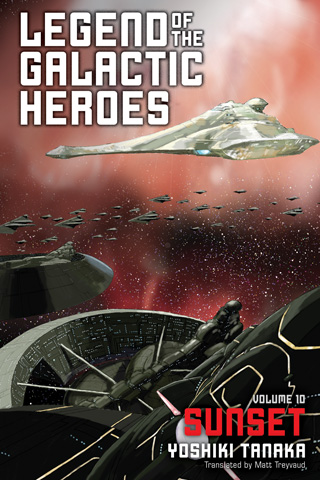 translated by Matt Treyvaud
translated by Matt Treyvaud
November 19, 2019
224 pages
* here be spoilers
Haikasoru has done it. They’ve published all ten books in Yoshiki Tanaka’s Legend of the Galactic Heroes series in English. Sadly, this was also one of Haikasoru’s last publications, but we can take heart from the fact that they’ve left us with a wealth of excellent Japanese speculative fiction in English translation.
But back to Legend of the Galactic Heroes Volume 10: Sunset. Translated beautifully by Matt Treyvaud (who also translated Volumes 8 and 9), Sunset brings the galaxy-spanning story of democracy vs. empire to a satisfying close. I say “satisfying” because honestly I didn’t know how Tanaka would be able to gather up all of the many threads he spun out over 1,800-pages, but he did it without making it seem rushed or implausible (except, of course, for the Julian/Katerose subplot). After all, we’ve known from early on that Reinhard was suffering from some mysterious illness (which is only named in Sunset), so his death at a young age is anything but a surprise. His marriage to the brilliant strategist Hildegard von Mariendorf and the birth of their son pretty much guaranteed that Reinhard was no longer needed on the galactic stage. As the narrator notes throughout the series, Reinhard’s star burns so brightly that it is bound to go out sooner rather than later.
Like Yang Wen-li, Reinhard fulfills his purpose over the course of the series, as if the boundaries of the story itself mark his particular destiny. These books are metaliterary, after all, with the narrator not only referencing other texts that discuss the struggles between the Empire and the Free Planets Alliance, but also calling attention to the text we have in front of us, which the narrator is “writing” in an attempt to advance their own particular interpretation of events. (I say “their” because the narrator’s gender is never made clear).
Sunset does what it needs to do: it shows us how Julian Mintz has grown into his role as commander of the Revolutionary Army; it depicts the ultimate defeat of Church of Terra fantatics; and it points the way forward for Hildegard and her son, the second Kaiser of the Lohengramm dynasty. The strange “romance” between Katerose von Kreutzer and Julian, though, definitely seemed rushed and flatter than a sheet of paper, but I won’t let that spoil the rest of the book. Tanaka offers the most optimistic kind of ending a series like this could have: the Empire will continue on, but instead of battling the Revolutionary Army until the latter is all but destroyed, it will begin to embrace certain elements of a constitutional government that will make the autocratic state less threatening to individual liberty. Of course, as Julian and his associates understand all to well, this could also be seen as an attempt by the Empire to slowly and cheerfully swallow democratic government whole, digesting it without incorporating any reforms whatsoever.
It’s been a wonderful experience reviewing this entire series over the course of the past three years. Honestly, I’ve forgotten many things about the early volumes, and feel like a re-read of all ten books is a must, but alas, I can’t embark on that journey just yet. I hope you, my readers, have found value in my thoughts on Tanaka’s grand space opera and that, if you weren’t already reading it, that you were convinced to go out and get yourselves copies. I’d love to hear your thoughts on this finale in the comments section below. Thanks for accompanying me on this journey!
*Read my reviews of Volumes 1, 2, 3, 4, 5, 6, 7, 8, and 9, as well as Charles Tan’s series overview.
